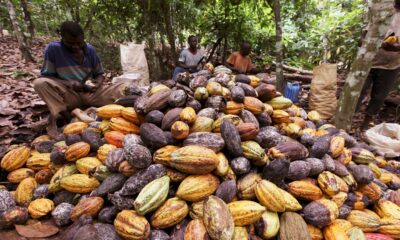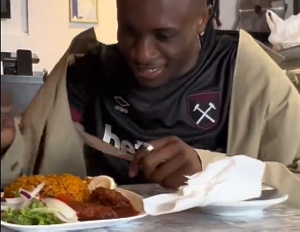Strictly Personal
Is Anas The Bill Cosby Of Ghana?
There is no doubt that Heath Cliff Huxtable and his family in the sitcom Cosby show made great impressions on our lives over the last couple of decades
Published
6 years agoon
There is no doubt that Heath Cliff Huxtable and his family in the sitcom Cosby show made great impressions on our lives over the last couple of decades. The physician and his attorney wife gave us all the important reasons for making education a priority in life and building a sound character to become good citizens. The spinoff of the show, ‘A different World” also maintained the same ethos where building of refined individuals capable of making wise decisions in a college environment was the theme.
Bill Cosby, the man who play Heath Cliff Huxtable, did a lot of good and I dare say single handedly put a lot of kids through college. The shows were an inspiration to many. Through the show, Bill Cosby made it possible for the average kid, especially the minority to believe that college education and staying on the right side of the law inspires a top middle class and beyond life style. I can credit my own zest and desires for further education to some of the show’s influence.
But the public perception of the man we adored so much, Cliff Huxtable, hid behind a dark side of Bill Cosby. Bill Cosby had all the good intentions to inspire society through comedy, but the demons of his innate character emerged to hunt him. It took another comedian to expose him.
Is Kennedy Agyapong the comedian to expose Anas? Kennedy is a loud mouth politician. He hasn’t got the training in fine language and one is tempted to immediately dismiss him as a braggart. He beats his chest like a gorilla in the forest, the king Kong of Ghana. Recently he has been crying foul, showing his own video of Anas allegedly involved in criminal acts. Is Kennedy Agyapong peeling the surface of something to look deeply into or is he blowing hot air? Not to discount the great work done by Anas, (as in the Cosby Show). The Anas exposĕ is admirable, but is he hiding his own demons?
Is Kwaku Baako standing by his man as Camellia Cosby continues to stand by Bill Cosby even as the courts prove him guilty? 64 women came forward to accuse Bill Cosby of inappropriate behavior, only one was admissible in court, yet, that was enough to convict Bill Cosby. Kennedy claims there are several people allegedly running to him with stories about Anas collecting bribe from them. These allegations should be thoroughly investigated, and even if one is found to be true, Anas should equally face the law. However, if these are found to be false, that, Honorable Kennedy Agyapong and his cronies fraudulently pieced clips together to tarnish the image of Anas, the honorable must be dealt with squarely.
Anas has filed a defamation suit of GHC25 million against Honorable Kennedy Agyapong. The honorable is quoted as saying; “GHC25million, I sit on that shit”. The pronouncements of the MP, Kennedy Agyapong, can often be distasteful. It is alleged that he was such a fine gentleman when he was a taxi driver in New York. Ghana politics must have rubbed him of his finesse. I hope the honorable will take a leaf from what Mrs. Obama said; ‘When they go low, you go high” but no, Kennedy Agyapong will wallow in the mud with his adversaries.
A breakdown in our legal system.
The Anas investigative work has been warranted because of the disregard for law enforcement in our society. The lack of political will on the part of our politicians and the legislature to act. Corruption and some traditional customs have rendered our laws and legal system impotent. As a matter of fact, everything Anas has uncovered hasn’t been a secret. They were and still are well known practices in the country that the institutions and legal apparatus have failed to address.
The entire country knows the Chiefs in Ghana sell land to multiple bidders. This is criminal, but how many Chiefs have been prosecuted, let alone jailed for this crime. How many Chiefs (including Otumfuo) have called a town hall meeting to declare to their people the cedi amount of the number of plots or acres of the township land that have been sold or royalties realized from companies of which the town or village will use for some identified development projects? None, (no accountability!).
Land in most villages and towns are sold as the Chief’s personal property, just as ministers use government coffers as their personal bank accounts. This behavior, big and small is paramount with people in positions of power and in law enforcement in Ghana. The partisan politics of cover ups is what has made necessary such sting operations, undercover investigation and set ups that Anas is using. The average Ghanaian is at a loss, running to churches, rivers and fetish priests looking for answers, all because, the laws in the land do not work to protect them.
Apparently, everything that happens in Ghana is spiritual and one needs to seek a spiritual doctor for directions. The judiciary system is like our hospitals in Ghana, “hit and miss”; one may need to try a few hospitals before finding a bed. And when a bed is found, a doctor may not be available or no diagnostic tools available for the doctor to work with. When one reports a case to the police, in many cases one has to pay for the transportation of the officer to attend to the case.
Read Also: The truth about being African versus dressing African
The bigger picture of this contention between Anas and Honorable Kennedy Agyapong is all because the laws in the land are not enforceable; mostly in conflict with tradition and culture. Kennedy Agyapong, an honorable minister of parliament, a member of the legislative branch, could announce on national television and to the world that he is married but has a girlfriend; proudly confirming that his wife knows he has a girlfriend and its part of Ghana’s tradition. So it is part of Ghana’s tradition to have stool wives.
So it is part of Ghana’s tradition to have stool servants or shrine slaves. So it is part of Ghana’s tradition for some chiefs to adjudicate on some cases. So it is part of Ghana tradition to find an influential elder to get you off the hook even when guilty. So it is part of Ghana’s tradition to send gifts to the Chiefs. In some cases, the Chiefs have aids who arrange for such “gifts’. No wonder even our judges are confused. Some of the judges claimed they acted in the traditional capacity to receive gifts but were not bribed.
Even some journalists (including Captain Smart who claims to fight corruption) gets confused discussing the subject; a gift for ‘influence peddling’ and a bribe. It is wrong and must be punishable to use the office of the state to travel and conduct transactions as if its private business. It is unethical if not criminal to use one’s position in the capacity of public service to receive gifts, solicited or unsolicited in any form with the intent to influence an outcome.
It is time Ghanaians evolve from those traditions that bring shame, turning the country into a bunch of jokers and elevate those elements of our culture that speak to Ghana as a constitutional democratic republic; a country with enforceable laws that govern the land. For this to be realized, Ghanaians must rise from the grassroots to the top; demanding accountability from the Chiefs to the ministers and to the President, call for a change to some of the antiquated traditions and customs that disadvantage the commoner and fly in the face of human rights, else there will be no progress in Ghana.
Commentator…..George Oteng Attakora
You may like
-


Bean disease affects 81% of major cocoa region in Ghana
-


Ghana: Inflation decreases to 22.8%
-


Mohammed Kudus promotes Ghanaian jollof during West Ham pre-season training
-


Ghana’s Energy Minister Prempeh selected as Bawumia’s presidential running mate
-


University of Ghana hosts exhibition on slavery at Elmina Castle
-


Ghanaian star Kudus in new ad for footwear makers Skechers along with Kane, Zinchenko, Elanga (Video)
Strictly Personal
All eyes in Africa are on Kenya’s bid for a reset, By Joachim Buwembo
Published
5 days agoon
July 21, 2024
Whoever impregnated Angela Rayner and caused her to drop out of school at the tender age of 16 with no qualifications might be disappointed that we aren’t asking who her baba mtoto (child’s father) is; whether he became a president, king or a vagabond somewhere, since the girl ‘whose leg he broke’ is now UK’s second most powerful person, 28 years since he ‘stole her goat’.
Angela’s rise to such heights after the adversity should be a lesson to countries which, six decades after independence, still have millions of citizens wallowing in poverty and denied basic human dignity, while the elite shamelessly flaunt obscene luxury on their hungry, twisted faces.
After independence, African countries also suffered their adolescent setbacks in the form of military coups. Uganda’s military rule lasted eight years, Kenya’s about eight hours on August 1, 1982, while Tanzania’s didn’t materialise and its first defence chief became an ambassador somewhere.
What we learn from Angela Rayner is that when you’re derailed, it doesn’t matter who derailed you, because nobody wants to know. What matters is that you pick yourself up, not just to march on, but to stand up and shine.To incessantly blame our colonial and slave-trading ‘derailers’ while we treat our fellow citizens worse than the colonialists did only invites the world to laugh. Have you ever read of a colonial officer demanding a bribe from a local before providing the service due?
African countries today need to press ‘reset’. A state operates by written policies, plans, strategies and prescribed penalties with gazetted prisons for those who break the rules. This is far more power than teenage Angela had, so a reset state should take less time to become prosperous than the 28 years it took her to get to the top after derailing.
So it’s realistic for countries to operate on five-year planning and electoral cycles, so a state that fails to implement a programme in five years has something wrong with it. It needs a reset.
A basic reset course for African leaders and economists should include:
1. Mindset change: Albert Einstein teaches us that no problem can be solved from the same level of consciousness that created it. For example, if you are in debt, seeking or accepting more debt is using the same level of thinking that put you there. If you don’t like Einstein’s genius, you can even try an animal in the bush that falls into a hole and stops digging. Our economists are certainly better than a beast in the bush.
2. Stealing is wrong: African leaders and civil servants need to revisit their catechism or madarasa – stealing public resources is as immoral as rape.
3. Justifying wrong doesn’t make it right: Using legalese and putting sinful benefits in the budget is immoral and can incite the deprived to destroy everything.
4. Take inventory of your resources and plan to use them: If Kenya, for example, has a railway line running from Mombasa to Nairobi, is it prudent to borrow $3.6 billion to build a highway parallel to it before paying off and electrifying the railway?
If Uganda is groaning under a $2 billion annual petrol import bill, does it make sense to beg Kenya for access to import more fuel, when Kampala is already manufacturing and marketing electric buses, while failing to use hundreds of megawatts it generates, yet the country has to pay for the unused power?
If Tanzania… okay, TZ has entered the 21st Century with its electric trains soon to be operating between Dar es Salaam and Morogoro. Ethiopia, too, has connected Addis Ababa to the port of Djibouti with a 753-kilometre electric railway, and moves hundreds of thousands of passengers in Addis every day by electric train.
5. Protect the environment: We don’t own it, we borrowed it from our parents to preserve it for our children. Who doesn’t know that the future of the planet is at stake?
6. Do monitoring and evaluation: Otherwise you may keep doing the same thing that does not work and hope for better results, as a sage defined lunacy.
7. Don’t blame the victims of your incompetence: This is basic fairness.
We could go on, but how boring! Who doesn’t know these mundane points? We are not holding our breath for Angela’s performance, because if she fails, she will be easily replaced. Africa’s eyes should now be on Kenya to see how they manage an abrupt change without the mass bloodshed that often accompanies revolutions.
Strictly Personal
The post-budget crisis in Kenya might be good for Africa, after all, By Joachim Buwembo
Published
2 weeks agoon
July 10, 2024
The surging crisis that is being witnessed in Kenya could end up being a good thing for Africa if the regional leaders could step back and examine the situation clinically with cool-headed interest. Maybe there is a hand of God in the whole affair. For, how do explain the flare not having started in harder-pressed countries such as Zambia, Mozambique and Ghana?
As fate would have it, it happened in East Africa, the region that is supposed to provide the next leadership of the African Union Commission, in a process that is about to start. And, what is the most serious crisis looming on Africa’s horizon? It is Debt of course.
Even the UN has warned the entire world that Africa’s debt situation is now a crisis. As at now, three or four countries are not facing debt trouble — and that is only for now.
There is one country, though, that is virtually debt-free, having just been freed from debt due to circumstances: Somalia. And it is the newest member of the East African Community. Somalia has recently had virtually all its foreign debt written off in recognition of the challenges it has been facing in nearly four decades.
Why is this important? Because debt is the choicest weapon of neocolonialists. There is no sweeter way to steal wealth than to have its owners deliver it to you, begging you, on all fours, to take it away from them, as you quietly thank the devil, who has impaired their judgement to think that you are their saviour.
So?
So, the economic integration Africa has embarked on will, over the next five or so years, go through are a make-or-break stage, and it must be led by a member that is debt-free. For, there is no surer weapon to subjugate and control a society than through debt.
A government or a country’s political leadership can talk tough and big until their creditor whispers something then the lion suddenly becomes a sheep. Positions agreed on earlier with comrades are sheepishly abandoned. Scheduled official trips get inexplicably cancelled.
Debt is that bad. In African capitals, presidents have received calls from Washington, Paris or London to cancel trips and they did, so because of debt vulnerability.
In our villages, men have lost wives to guys they hate most because of debt. At the state level, governments have lost command over their own institutions because of debt. The management of Africa’s economic transition, as may be agreed upon jointly by the continental leaders, needs to be implemented by a member without crippling foreign debt so they do not get instructions from elsewhere.
The other related threat to African states is armed conflict, often internal and not interstate. Somalia has been going through this for decades and it is to the credit of African intervention that statehood was restored to the country.
This is the biggest prize Africa has won since it defeated colonialism in (mostly) the 1960s decade. The product is the new Somalia and, to restore all other countries’ hope, the newly restored state should play a lead role in spreading stability and confidence across Africa.
One day, South Sudan, too, should qualify to play a lead role on the continent.
What has been happening in Kenya can happen in any other African country. And it can be worse. We have seen once promising countries with strong economies and armies, such as Libya, being ravaged into near-Stone Age in a very short time. Angry, youthful energy can be destructive, and opportunistic neocolonialists can make it inadvertently facilitate their intentions.
Containing prolonged or repetitive civil uprisings can be economically draining, both directly in deploying security forces and also by paralysing economic activity.
African countries also need to become one another’s economic insurance. By jointly managing trade routes with their transport infrastructure, energy sources and electricity distribution grids, and generally pursuing coordinated industrialisation strategies in observance of regional and national comparative advantages, they will sooner than later reduce insecurity, even as the borders remain porous.
EDITOR’S PICK


Trevor Noah set for ‘Off the Record’ world tour
South African comedian and talk show host, Trevor Noah, has announced a date for his “Off The Record” global tour...


SA mobility startup LULA acquires UK-based Zeelo’s operations
South Africa’s mobility startup, LULA, has announced the acquisition of the operations of UK-based Zeelo in a move that will...


Ngannou accuses Joshua of employing dirty tactics in their fight in Saudi Arabia
Former UFC heavyweight champion, Francis Ngannou, has accused British-Nigerian boxer, Anthony Joshua, and his promotion team of employing unfair and...


#EndBadGovernance Protests: Please be patient with Tinubu’s govt, monarchs beg Nigerian youths
Some prominent traditional rulers in Nigeria have pleaded with Nigerian youths and organizers of the planned nationwide #EndBadGovernance protests scheduled...


UNESCO removes Senegal’s Niokolo-Koba National Park from list of World Heritage sites in danger
The United Nations’ Educational, Scientific and Cultural Organization (UNESCO) has removed Senegal’s Niokolo-Koba National Park from the list of World...


At Project Aliyense discourse, panelists call for balance between free speech, ethical considerations
The government has been urged to balance freedom of speech with ethical considerations and laws that prevent harm to others....


Adenia Partners acquires Air Liquide’s operations in 12 African countries
Adenia Partners, a leading private equity firm, has completed the acquisition of Air Liquide’s operations in 12 African countries, adopting...


We will handle planned nationwide protests as family matter— Nigerian Govt
The Nigerian government says it will handle the planned #EndBadGovernance protests scheduled to commence on August 1 as a family...


Veteran Nigerian entertainer Charly Boy vows to divorce wife if Kamala Harris doesn’t win US presidential election
Veteran Nigerian entertainer, Charles Oputa, popularly known as Charly Boy, has vowed to divorce his wife of 47 years if...


Saudi club Al Hilal places African transfer record bid for Osimhen
Saudi Arabia club side, Al-Hilal, have reportedly made an African transfer record bid for Super Eagles and Napoli striker, Victor...
Trending
-

 Sports1 day ago
Sports1 day agoMeet Nigerian-born players doing big things for Japan at Paris 2024 Olympics
-

 Metro2 days ago
Metro2 days agoWe will handle planned nationwide protests as family matter— Nigerian Govt
-

 Tech2 days ago
Tech2 days agoAdenia Partners acquires Air Liquide’s operations in 12 African countries
-

 Metro18 hours ago
Metro18 hours ago#EndBadGovernance Protests: Please be patient with Tinubu’s govt, monarchs beg Nigerian youths


